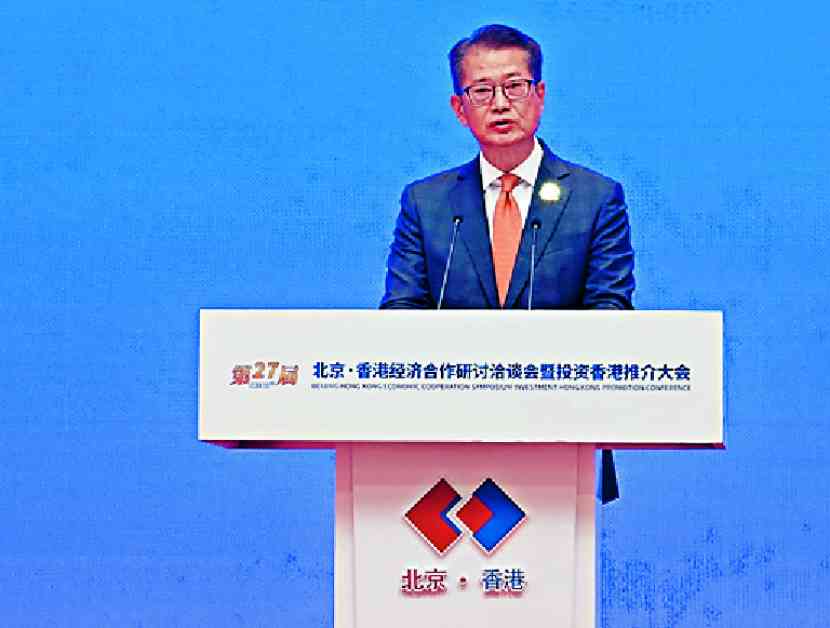Financial Secretary Paul Chan Mo-po is on a mission to boost Hong Kong’s economy by diversifying its sources of funding. With the stock market on the rise, Chan sees an opportunity to expand the city’s financial streams and attract more investment. His commitment to this goal was evident as he embarked on a week-long visit to Madrid and London, accompanied by executives from the Science Park and Cyberport, following his participation in an investment conference in Beijing.
The recent performance of the Hang Seng Index, which closed at 18,258 points on Friday, reaching a more than two-month high, has been encouraging. The broader market also saw a transaction volume of HK$176.8 billion, the highest level in nearly four months. These positive indicators demonstrate the potential for growth and investment in Hong Kong’s financial sector.
One significant development is the surge in initial public offering fundraising in the city for 2024, which has already surpassed last year’s total amount. Additionally, listed companies have raised more than US$20 billion (HK$155.8 billion) in proceeds this year through financing activities. This influx of capital signals a growing confidence in Hong Kong’s economy and its potential for expansion.
Chan emphasized the importance of monitoring local capital flows and market conditions to determine the appropriate response to base interest rate cuts following changes in the US rates. This strategic approach aims to ensure stability and sustainability in Hong Kong’s financial landscape, while also capitalizing on opportunities for growth and investment.
However, not all ventures have been met with success in the current market environment. Reports indicate that the securities regulator has halted the offshore share offering plans of at least three Chinese bubble tea makers due to the underperformance of their peers in Hong Kong and weaker consumer sentiment at home. One such example is Sichuan Baicha Baidao Industrial (2555), which raised US$330 million in April but has since seen a 70 percent decline from its HK$17.5 per share IPO price.
Chabaidao, as the tea chain is known, reported a 10 percent drop in gross revenue and a 19 percent fall in gross profit in the first half of this year compared to the same period last year. These challenges highlight the importance of adapting to market conditions and consumer trends to ensure the success and sustainability of businesses in Hong Kong’s competitive market.
As Hong Kong navigates the changing economic landscape, it is crucial for businesses and policymakers to stay agile and innovative in their approach to funding and investment. By diversifying funding sources and adapting to market dynamics, Hong Kong can position itself as a hub for financial growth and stability in the region.
Exploring New Investment Opportunities
One of the key strategies outlined by Financial Secretary Paul Chan is the exploration of new investment opportunities to expand Hong Kong’s funding streams. By engaging with international partners and exploring potential collaborations, Hong Kong can attract diverse sources of funding and investment to fuel economic growth.
Chan’s visit to Madrid and London, along with executives from the Science Park and Cyberport, underscores the city’s commitment to fostering international partnerships and exploring new avenues for investment. By tapping into global markets and leveraging Hong Kong’s strategic location and business-friendly environment, Chan aims to attract foreign investment and expand the city’s financial resources.
Adapting to Market Conditions
The recent challenges faced by Chinese bubble tea makers in Hong Kong serve as a reminder of the importance of adapting to market conditions and consumer trends. As consumer sentiment fluctuates and market dynamics shift, businesses must be agile and responsive to ensure their long-term success and sustainability.
The case of Sichuan Baicha Baidao Industrial highlights the risks associated with offshore share offerings and the need for companies to closely monitor market performance and consumer demand. By staying attuned to market conditions and adjusting their strategies accordingly, businesses can mitigate risks and capitalize on opportunities for growth and expansion.
Building Resilience in Hong Kong’s Economy
As Hong Kong’s financial landscape continues to evolve, building resilience in the economy is paramount to weathering economic uncertainties and capitalizing on growth opportunities. By diversifying funding sources, monitoring market conditions, and adapting to consumer trends, Hong Kong can strengthen its position as a leading financial hub in the region.
Financial Secretary Paul Chan’s pledge to expand the city’s funding streams reflects a proactive approach to driving economic growth and attracting investment. By fostering international partnerships, exploring new investment opportunities, and adapting to market conditions, Hong Kong can build a resilient and dynamic economy that is well-equipped to thrive in an ever-changing global market.
